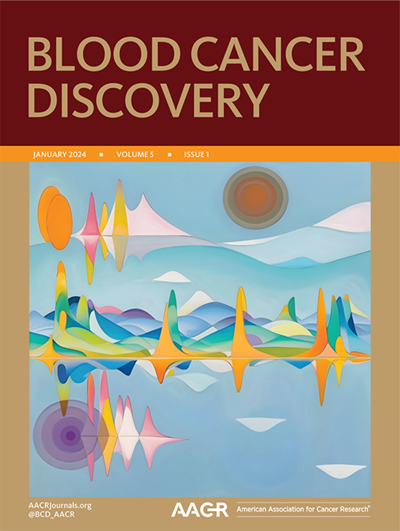Global Shift in Alternative Splicing and Therapeutic Susceptibilities in Leukemia Driven by METTL3 Overexpression.
IF 11.5
Q1 HEMATOLOGY
引用次数: 0
Abstract
Summary: Mutations in splicing factors are commonly observed in chronic lymphocytic leukemia (CLL); however, other mechanisms can also contribute to the dysregulation of alternative splicing. One example is the overexpression of the m6A RNA methyltransferase METTL3, that by depositing the epitranscriptomic mark in spliceosome transcripts leads to aberrant splicing, but at the same time creates vulnerability to METTL3 inhibitors. See related article by Wu et al., p. 228 (8) .
METTL3过表达驱动的白血病选择性剪接和治疗易感性的整体变化。
摘要:剪接因子突变在慢性淋巴细胞白血病(CLL)中常见;然而,其他机制也可能导致选择性剪接的失调。一个例子是m6A RNA甲基转移酶METTL3的过表达,通过在剪接体转录物中沉积表转录组标记,导致异常剪接,但同时产生对METTL3抑制剂的易感性。参见吴等人的相关文章,第228(8)页。
本文章由计算机程序翻译,如有差异,请以英文原文为准。
求助全文
约1分钟内获得全文
求助全文
来源期刊

Blood Cancer Discovery
Multiple-
CiteScore
12.70
自引率
1.80%
发文量
139
期刊介绍:
The journal Blood Cancer Discovery publishes high-quality Research Articles and Briefs that focus on major advances in basic, translational, and clinical research of leukemia, lymphoma, myeloma, and associated diseases. The topics covered include molecular and cellular features of pathogenesis, therapy response and relapse, transcriptional circuits, stem cells, differentiation, microenvironment, metabolism, immunity, mutagenesis, and clonal evolution. These subjects are investigated in both animal disease models and high-dimensional clinical data landscapes.
The journal also welcomes submissions on new pharmacological, biological, and living cell therapies, as well as new diagnostic tools. They are interested in prognostic, diagnostic, and pharmacodynamic biomarkers, and computational and machine learning approaches to personalized medicine. The scope of submissions ranges from preclinical proof of concept to clinical trials and real-world evidence.
Blood Cancer Discovery serves as a forum for diverse ideas that shape future research directions in hematooncology. In addition to Research Articles and Briefs, the journal also publishes Reviews, Perspectives, and Commentaries on topics of broad interest in the field.
 求助内容:
求助内容: 应助结果提醒方式:
应助结果提醒方式:


